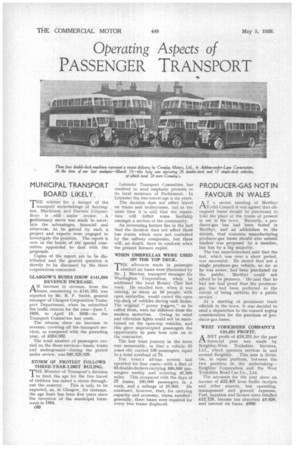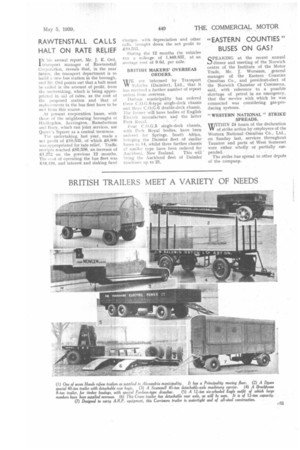Operating Aspects of
Page 110

Page 111

If you've noticed an error in this article please click here to report it so we can fix it.
PASSENGER TRANSPORT
MUNICIPAL TRANSPORT BOARD LIKELY
THE scheme for a merger of the transport undertakings of Accrington, Blackburn and Darwen Caipora
tions is _ still . under review. A preliminary move was made to ascertain the advantages, financial and otherwise, to be gained by such a project and experts were engaged to investigate the position. The report is now in the hands, of the special committee appointed to deal with the proposals. .
Copies of the report are to be distributed and the general question is shortly to be discussed by the three corporations concerned.
GLASGOW'S BUSES SHOW 1141,283 REVENUE INCREASE.
AN increase in revenue, from the buses, amounting to £141,283, was reported by Mr. R. F. Smith, general manager of Glasgow Corporation Transport Department, when he submitted the traffic returns for the year—June 1, 1938, to April 15, 1939—to the Transport Committee last week.
The returns show an increase in revenue, covering all the transport services, as compared with the preceding year, of £254,062.
The total number of passengers carried on the three services—buses, trams and underground—during the period under review, was 569,329,029.
STORM OF PROTEST FOLLOWS THREE-YEAR-LIMIT RULING.
THE Minister of Transport's decision to limit the age for the free travel of children has raised a storm throughout the country. This is only to be expected, as, in Glasgow, for instan.ce, the age limit has been five years since the inception of the municipal tramways in 1894,
c60 Leicester Transport Committee has resolved to send emphatic protests to its local members of Parliament. In Leicester the free-travel age is six years.
The decision does not affect travel on trams and trolleybuses, but at the same time it is said that the regulation will inflict some hardship amongst a section of the community.
An interesting feature lies in the fact that the decision does not affect those bus routes which were not contested by the railway companies, but these will, no doubt, have to conform when the present licences expire.
WHEN UMBRELLAS WERE USED ON THE TOP DECK.
THE advances made in passenger comfort on buses were illustrated by Mr. J. Newton, transport manager for Warrington Corporation, when he addressed the local Rotary Club last week. He recalled how, when it was raining, as many as 20 people, with open umbrellas, would crowd the open top-deck of vehicles during rush hours. The original "penny joggers," as he called them, were far different from the modern motorbus. Owing to wind and vibration lights could not be maintained on the open-top vehicles, and this gave unprincipled passengers the opportunity to pass base coin on to the conductor.
The last train journey in the town was memorable, in that a vehicle 33 years old, carried 136 passengers, equal to a total overload of 78. .
Tile town's all-bus system had operated for four years—with a fleet of 63 double-deckers carrying 500,000 passengers weekly and covering 41,000 miles. This compated with the days of 27 trams, 180,000 passengers in a week, and a mileage of 10,600. He confessed, however, that, for carrying capacity and economy, trams excelled: generally, three buses were required for every two trams displaced.
PRODUCER-GAS NOT IN FAVOUR IN WALES
AT a recent meeting of Merthyr Tydfil Council it was agreed that oilengined buses should be purchased to take the place of the trams at present in use in the town. Recently, a producer-gas bus had been tested in Merthyr, and an addendum to the Minute, that concerns manufacturing producer-gas buses should also submit tenders was proposed by a member, but lost by a big majority.
The bus superintendent said that the test, which was over a short period, was successful. He stated that not a single producer-gas vehicle, so far as he was aware, had been purchased .oy the public. Merthyr could not afford to be pioneers. He said that he had not had proof that .the producergas bushad been perfected to the extent of being suitable for a public service.
At a meeting of prominent trade officials in the town, it was decided to send a deputation to the council urging consideration for the purchase of producer-gas buses.
WEST YORKSHIRE COMPANY'S £24,231 PROFIT.
ANET profit of £24,231 for the past financial year was made by Keighley-West Yorkshire Services, Ltd., which operates services in and around Keighley. This sum is divisible, in equal portions, between the two partners in the undertaking-Keighley Corporation and the West Yorkshire Road Car Co., Ltd.
The accounts for the year show an income of £53,467 from traffic receipts and other sources, less operating, management and general expenses. Fuel, taxation and licence costs totalled £12,728, income tax absorbed £8,620, and interest on loans, £880.
RAWTENSTALL CALLS HALT ON RATE RELIEF
r. his annual report, Mr. J. E. Ord, 1 zIrinsport manager of Rawtenstall Corporation, reveals that, in the near future, the transport department is to build a new bus station in the borough, and Mr. Ord points out that a halt must be called in the amount of profit, from the undertaking, which is being appropriated in aid of rates, as the cost of the proposed station and that of replacements in the bus fleet have to be met from this source. .
At present corporation buses, with those of the neighbouring boroughs of Haslingden, Accrington, Ramsbottom and Bury, which run joint services, use Queen's Square as a central terminus.
The undertaking, last year, made a net profit of £10,535, of which £8,000 was appropriated for rate relief. Traffic receipts reached £85,536, an increase of £1,272 on the previous 12 months. The cost of operating the bus fleet was £58.439, and interest and sinking fund charges, with depreciation and other calls, brought down the net profit to £ During the 12 months the vehicles ran a mileage. of 1,449,857, at an average cost of 9.6d. per mile.
BRITISH MAKERS' OVERSEAS ORDERS.
IVE are informed by Transport VV Vehicles (Daimler), Ltd., that it has received a further number of repeat orders from overseas.
L)nrl,aim municipality has ordered three C.O.G.6-type single-deck chassis and three C.O.G.6 double-deck chassis. The former will have bodies of English Electric manufacture and the latter Park Royal.
Four C.O.G.5 single-deck chassis, with Park Royal bodies, have been ordered for Springs, South Africa, bringing the Daimler fleet of similar buses to 14, whilst three further chassis of similar type have been ordered for Auckland, New Zealand. This will bring the Auckland fleet of Daimler machines up to 21.
"EASTERN COUNTIES" BUSES ON GAS?
SPEAKING at the recent annual dinner and meeting of the Norwich centre of the Institute of the Motor Trade, Mr. 3. Worssain, general manager of the Eastern Counties Omnibus Co., and president-elect of the Norwich Chamber of Commerce, said, with reference to a possible shortage of petrol in an emergency. that the service with which he was connected was considering gas-producing systems.
"WESTERN NATIONAL" STRIKE SPREADS.
WITHIN 24 hours of the declaration VV of strike action by employees of the Western National Omnibus Co., Ltd., on Sunday last, services throughout Taunton and parts of West Somerset were either wholly or partially suspended.
The strike has spread to other depots of the company.
































































































































































